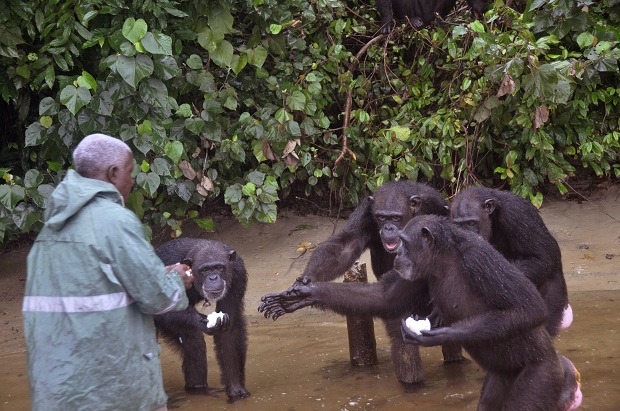Liberians look for help to care for research chimps

In this photo taken on Tuesday, Aug. 18, 2015, a caretaker feeds chimpanzees on the six mangrove outcroppings that make up Chimpanzee Island, about 50 kilometers (31 miles) southeast of Liberia’s capital, Monrovia. These chimpanzees are among 66 that were used for research for years. The New York Blood Center did tests on the chimps for Hepatitis B and other diseases in Liberia in the 1970s, stopping about a decade ago. In March the center stopped payments to care for the animals, according to the Washington-based Humane Society, which is now helping to support the chimpanzees and looking for a long-term solution. AP
CHIMPANZEE ISLAND, Liberia — Eleven chimpanzees rushed out from the bush and descended from trees to the shore, making jubilant sounds to greet the speed boat bringing food.
Samantha, the oldest of the group in her mid-forties, along with Mabel, Bullet and others eagerly welcomed their daily delivery of pumpkins, rice, plantains and papaya. Some impatiently ran into the water to meet the boat.
These chimpanzees are among 66 that were used for research for years. The New York Blood Center did tests on the chimps for Hepatitis B and other diseases in Liberia in the 1970s, stopping about a decade ago. In March the center stopped payments to care for the animals, according to the Washington-based Humane Society of the United States, which is now helping to support the chimpanzees and looking for a long-term solution.
After years in captivity, the chimpanzees are dependent upon human care. They live on six mangrove outcroppings that make up Chimpanzee Island, situated where the Farmington and Little Bassa rivers meet before emptying into the Atlantic Ocean, about 50 kilometers (31 miles) southeast of Liberia’s capital, Monrovia.
“We don’t give any of them food until all of them have gathered so that they are served together,” said Joseph Thomas who has looked after the chimps for 36 years.
Approaching them, he gently stroked their noses and rubbed their lips and heads. “It is a great experience for me,” he told The Associated Press.
The noises stop as the chimps eat, sitting about four feet to six feet apart.
Then dessert is served — coconuts. The chimps peel them with their teeth and bash them on rocks to crack them open and devour the treat inside.
The scene plays out on each of six mangrove islands. On one, a clever chimp ate his meal quickly, washed his hands and rejoined the line of those who had not yet been served. The caretaker recognized him and told him that he cannot have more.
The New York Blood Center “walked away from their responsibility,” Dr. Fatorma Bolay, director of The Liberian Institute for Biomedical Research, told The Associated Press. “We are doing our best.”
On its website the New York Blood Center said the animals are owned by Liberia’s government, “and their officials have repeatedly acknowledged that they have responsibility for the care of the chimpanzees.” It said its support of the chimpanzees was voluntary.
“Eventually, we had no choice but to inform the Liberians that we could no longer provide this charitable support and provided advance notice to ensure a smooth transition,” it said.
But the funding pullout created a huge gap of support for the staff and the chimpanzees, said John Abayomi Zeonyuway, a volunteer and co-director of the Liberian institute. The notification also came during the largest ever Ebola outbreak.
“The resources we have now are very limited,” he said. “What if the Humane Society pulls out? Then these chimps will starve to death completely.”
The mangrove islands are lush green, but there is little food for the chimps. Surrounded by brackish, salty water they are dependent upon reservoirs of fresh water that the caretakers fill regularly. Taking care of the animals costs between $25,000 and $30,000 per month, said Zeonyuway. The cash-strapped Liberian government has not shown interest in caring for the chimps, he said.
The Humane Society of the United States has raised about $160,000 through crowd funding site GoFundMe, said Kathleen Conlee, the organization’s vice president of animal research.
“The outpouring of support for the chimpanzees has been wonderful but this fundraising is not something we can sustain long-term,” she said. “New York Blood Center must reinstate some level of funding and we are going to continue to pressure them until they do. They were the ones who captured chimpanzees from the wild and created this horrible situation.”
Residents near the chimpanzee colony say they appreciate the difficulties the animals are going through, but they themselves are scraping by as small-scale fishermen.
“The feeding of these animals should be everybody’s business,” said Christine Garr, 35, a local fish seller in Marshall.
The human relationship with these chimpanzees has been fraught. Taken from the wild and held captive for research, they were later released on the mangrove islands but do not know how to live independently. During Liberia’s civil war in the 1990s, many of the more than 160 chimpanzees that had been retired to the islands were killed by soldiers or died of starvation, said Zeonyuway.
The 66 remaining chimpanzees continue to face challenges.
“They’ve been in civility for a very long time, some of them were born in civility and spent 20 to 25 years in captivity,” for biomedical research work all those years, Thomas said. “So you cannot just put them into the wild now.”














